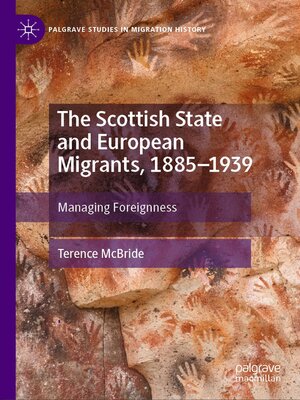The Scottish State and European Migrants, 1885–1939
ebook ∣ Managing Foreignness · Palgrave Studies in Migration History
By Terence McBride

Sign up to save your library
With an OverDrive account, you can save your favorite libraries for at-a-glance information about availability. Find out more about OverDrive accounts.
Find this title in Libby, the library reading app by OverDrive.



Search for a digital library with this title
Title found at these libraries:
| Library Name | Distance |
|---|---|
| Loading... |
This book examines the efforts of the government in Scotland to manage the increase of migrants travelling to Britain at the end of the nineteenth century. Focussing on the period between 1885 and 1939, the book explores how the Scottish machinery of government handled the administration of 'foreigners.' The author uses a comparative, thematic approach to analyse migrant experiences, identities, and relationships with state institutions. Drawing from state records held by the National Records of Scotland in Edinburgh, the book argues that Scottish officials in semi-autonomous boards began to recognise, describe and enumerate the presence of the 'foreigner' in the early twentieth century, framing their handling of foreignness in accordance with the Aliens Act of 1905. The author goes on to explain that institutions operating in Scotland developed a distinctly Scottish approach to alien matters, which continued up until the Second Word War. Therefore, an increasing number of importantdecisions affecting migrants were taken by a distinctly Scottish machinery of government, impacting on how Scottish officials understood foreignness, and how those identified as foreigners understood their identity in relation to Scottishness. Contributing significantly to current heated debates on migration and identity amongst researchers and the general public in Europe and beyond, this book provides essential insights into the ways in which a 'sub-state' began to develop practices, processes and attitudes towards migration which were not always in line with that of the central government.







